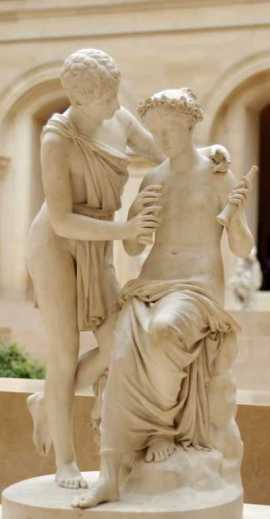Many characters and stories of the archaic Greek literature are still alive in our imagination. Epic battles and travel adventures have portrayed us authentic heroes on both sides of winners and defeated, nonetheless we must note that love and romance play a minor role in this literature. Certainly the farewell between Hector and Andromaca – one of the most beautiful pages of Iliad – or the love of Kalypsó for Odysseus are romantic episodes, although they are principally used to enhance the tragic climax and/or magnify the power of will of the hero rather than to describe a love story the way we would expect nowadays.

Undoubtedly Sappho’s poems or Alcman’s nocturne are verses of unimaginable power and love. Nonetheless is during the Alexandrine period that love becomes a major theme of poetry and also – something rather new – novel. In these centuries a new sensibility and attention are devoted to romance, affections and love. Love for the beloved, for the nature, for family members and even for pets is often praised in long and somewhat tedious descriptions (εκφρασεις). The Alexandrine authors mostly loved small compositions like idylls and epigrams, nonetheless in the very same period some long novels and poems were produced like Alexandra, Phenomena and the Argonauts.
Several revolutionary changes had happened in those days: the freedom of poetry from music – which for centuries had been inextricably tied together; and a wider alphabetisation among the Greek world together with the enlargement of the borders after the conquest of Alexander, which had opened a larger audience to the novel productions. Under these circumstances the Greek fiction and romance novel developed amazingly quickly as a new and successful genre. In the beginning these romantic novels kept an historical (or semi-historical) framework and background, while the tale itself was a sort of written transposition of Menander’s New Comedy’s stories and themes. Therefore an amiable combination of history, religion and myth were all subdued by the main theme i.e. love, that always triumphed on anything and won any adversity. It is also interesting to observe that in the beginning, the early authors – in spite of their success – wrote under pseudonyms, most certainly to avoid the critics from the academics.
Several were the sources of inspiration for these fiction and romance novelists: many recurring themes have also Assyrian, Syrian, Jewish and Egyptian roots. However these themes gave birth probably to the very first fiction and romance novels of the ancient literature.
Ninus Romance, within an historical framework is a love story with happy ending between an Assyrian King and his beloved.
The story of Joseph and Aseneth, narrates the love and religious conversion of the Egyptian spouse of Joseph.
The Dream of Nectanebo, based on the prophecy of the demise of Nectanebo II (359-342 BC), the last native ruler of Egypt is filled with both romance and destruction as the story exploits this dual nature of the goddess with which Petesis (the protagonist) falls in love. He is attracted to the girl, but the affair will eventually lead to his destruction. Sesanchosis is a fiction story based on the historical character of King Senworset I of Egypt.
The Oracle of the Potter into which a prophecy looks forward to a golden age, when a good daemon or king will come as a source of evil to the Greeks, and reduce the upstart city by the sea (i.e. Alexandria of Egypt) to a place where fishermen dry their nets and thus revealing dissatisfaction in Egypt with the Greek-Alexandrine administration.
Later on during the Roman Empire – Heliodorus of Emesa with his Aethiopica, Longus with his Daphnis and Chloe and Virgil with his Aeneid, followed these forerunners helping to pave the way to modern romance and fiction novels.
Love themes take over also epic-poetry as probably the first and best description of passions and sufferings caused by love in a true romantic guise is found in the Argonauts of Apollonius Rhodius, where for the first time love, and not action, is the main theme of the epic poem. The desperation and the incredible love of Medea for Jason, as no obstacle can stop Medea from her obsession towards her beloved, are portrayed in such a deep and new way, that neither Euripides had reached nor Virgil’s Aeneid would later succeed to imitate. The impact of Apollonius representation of love and the pathos he expresses could easily pass for modern romance literature:
Her heart fell from out her bosom,
and a dark mist came over her eyes, and a hot blush covered her
cheeks. And she had no strength to lift her knees backwards or
forwards, but her feet beneath were rooted to the ground; and
meantime all her handmaidens had drawn aside. So they two stood
face to face without a word, without a sound, like oaks or lofty
pines, which stand quietly side by side on the mountains when the
wind is still; then again, when stirred by the breath of the
wind, they murmur ceaselessly; so they two were destined to tell
out all their tale, stirred by the breath of Love.


Very nicely done!
Thank you Rachel, indeed.
I have browsed for a while through your weblog and I found it insightful and touching: I compliment you.
I hope you will keep reading my articles, as I will read yours for sure.
Atheneion
I love greek litterature! I love greek history. But they are quite scarce in Africa. If you have any researves of free ancient romantic novices, I will much appliciate it. I will desire you sent it to me free of charge. thanks… God bless..
Frank, Nigeria.
Hi Francis,
so nice to read your comment. I am so glad we share this interest for the ancient Greek world.
As to the books…
All the best,
Atheneion
hii hoes loving the picture its freakkkayyyyyyyyyyyyyyyyyyyyyyyyy